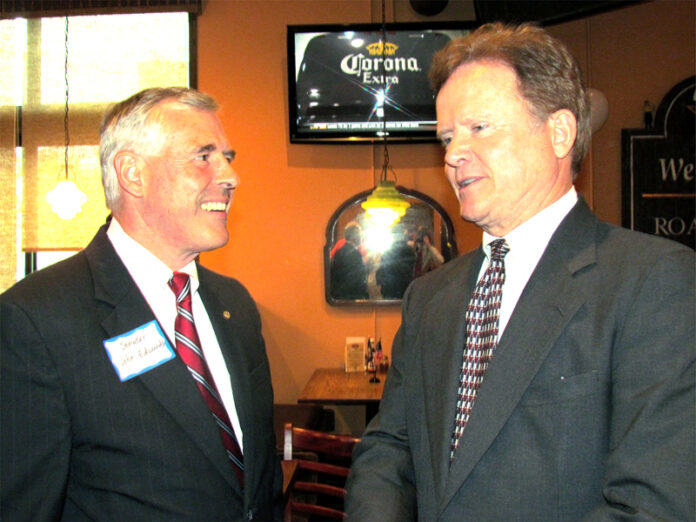
In between an event for Sen. Phil Puckett (D-38) and a fundraiser for fellow Marine Sen. John Edwards (D-21), U.S. Senator Jim Webb put politics aside as he spoke to and took questions from veterans at the Vinton War Memorial Monday.
Webb served as a Marine Rifle Platoon Commander in Vietnam and was awarded the Navy Cross, Silver Star, Bronze Star Medals and two Purple Hearts. He later served as Secretary of the Navy.
He has served on the Senate Committee of Foreign Relations, the Armed Services Committee and the Veteran Affairs Committee. Webb is stepping down from the Senate when his term ends in 2013.
“Don’t take your son to a combat zone,” Webb told the veterans. He recounted that he brought his son with him to Afghanistan as his photographer when he was writing one of his books. When they returned, his son Jimmy enlisted and was then sent to Iraq just as Webb’s campaign kicked off in 2006.
Senator Webb said “he felt very strongly that [veterans after 9/11] were the next ‘greatest generation’ and wanted to make sure they had the same opportunity for the future as the [WWII] ‘greatest generation.’”
Webb began working on a post 9/11 GI Bill on his first day in office. He learned quickly how to get things done in a “divided political system.” Along with the help of Republican U.S. Senator John Warner, the GI Bill passed.
“Veterans who served since 9/11 now have the best GI Bill in history,” said Webb.
Webb estimated that 580,000 members of the armed forces serving since 9/11 have access to the benefits of the GI Bill. “For every tax dollar spent on the WWII GI Bill, we got seven dollars back of professional output,” was his argument to his colleagues in getting the bill passed.
With extended tours in Iraq and Afghanistan, Post Traumatic Stress was a big issue in 2006. Webb, a Democrat, along with former Republican Senator Chuck Hagel, introduced the “Dwell Time Amendment.” The legislation basically said that “no one should have to be deployed if they haven’t been home as long as they’ve been gone,” said Webb. It established a one-to-one ratio where previously it was .75-to-one.
“It’s not political – it’s a safety net for the people that served,” said Webb. It got 56 votes, 4 votes short of the 60 needed and they lost. Defense Secretary Robert Gates threatened to recommend vetoing it, predicting “force management problems” and fear of another national emergency.
In response to a question from a veteran, Webb confirmed that deployment frequency had improved since then and is now reaching a two-to-one ratio.
Webb is the Chairman of the Personnel Subcommittee of the Armed Service Committee. He credited the standards he laid down as a committee member for his successful efforts on behalf of all veterans. “The obligation our country made to the people who have served may not be specifically contractual but it is a moral obligation,” he said.
He stayed firm in his position to never denigrate veterans’ health care or change the 20-year retirement system. “We’re not going to solve the country’s problems on the backs of the people who served,” said Webb.
Robert Gray, an 80 year old Korean War veteran, asked for Sen. Webb’s help in including National Guard active duty time (ADT) as part of the 180-day requirement to be eligible for Veterans Administration benefits. He wants Webb to champion that in Washington.
Senator Webb left the Vinton War Memorial and dashed to Fork in the City along with Sen. Edwards. The Edwards’ re-election fundraiser immediately followed Webb’s speech. His attendance was to be brief. Webb had to get back to Washington to vote on another extension to fund the federal government.
After his two-minute speech supporting fellow Marine John Edwards turned into 5 minutes, Webb’s handlers began “prompting” Webb to leave. Webb lingered a bit longer before finally leaving with no hope of making it back to Washington in time, saying he was sure that Majority Leader Harry Reid would hold the vote open for him and others who were out and about.
Tuesday, Steve McGraw, Roanoke County Clerk of Court, wrote in an email, “the traffic between Dulles airport and downtown D. C. was very bad, so even though he left Roanoke on time, Jim missed the first funding vote in the Senate but was there for the second one.”
The Senate approved funding the government until November 18, including the funding for FEMA. It was determined that FEMA would have enough funds to last for the rest of the fiscal year that ends Friday.

